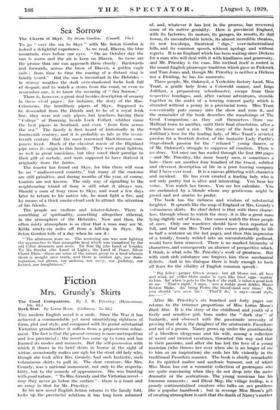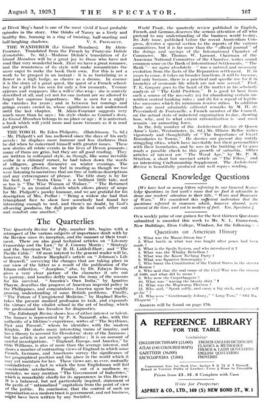Fiction
Mrs. Grundy's Skirts
Dark Star. By Lorna Moon. (Collanez. is. 6d.) THE modern English novel is a snob. Since the War it has achieved a commendable yet most unsatisfying rightness of form, plot and style, and compared with its genial substantial Victorian grandmother it suffers from a preposterous refine- ment. The fact is that the present century is more metropolitan and less provincial ; the novel has come up to town and has learned its modes and manners. But the self-possession with which it draws in its brief skirts in horror at the sight of virtue, occasionally makes one sigh for the stout old lady who, though she took after Mrs. Grundy, had such fantastic, such voluminous skirts to pull in. The dear creature, like Mrs. Grundy, was a national monument, not only to the respecta- bility, but to the comedy of appearances. She was bursting with good nature. " To Mrs. Grundy and the Victorian novel— may they never go below the surface "—there is a toast and an essay in that for Mr. Priestley.
In his new novel English fiction returns to the family fold, looks up the provincial relations it has long been ashamed of, and, whatever it has lost in the process, has recovered some of its native geniality. Here is provincial England, with its factories, its motors, its garages, its resorts, its dull towns, its uncomfortable hotels, its almost incredible theatres, its new tea-shops, theatrical " digs," over-industrialized hills, and its common speech, without apology and without regrets. It is an England which has been waiting since Dickens for a man who will deal with it with kindliness and generosity, and Mr. Priestley is the man. His method itself is rooted in the sound English picaresque tradition which gave us Pickwick and Tom Jones and, though Mr. Priestley is neither a Dickens nor a Fielding, he has his moments.
Three people, Mr. Oakroyd, a Yorkshire factory hand, Miss Trant, a gentle lady from a Cotswold manor, and Inigo Jollifant, a preparatory schoolmaster, escape from their respective bondages, and, after various adventures, stumble together in the midst of a touring concert party which is stranded without a penny in a provincial town. Miss Trant conveniently puts money into the show and runs it, and the remainder of the book describes the wanderings of The Good Companions—as they call themselves—from one Midland town to another, until their final dissolution, after a rough house and a riot. The story of the book is not of Jollifant's love for the leading lady, of Miss Trant's secreted passion for a Scottish doctor, of the fantastic Lady Partlit's stage-struck passion for the " refaned " young dancer, or of Mr. Oakroyd's struggle to suppress all emotion. There is no story. Yet once one has waded through the first 200 pages —and Mr. Priestley, like most hearty men, is sometimes a bore—there are another four hundred of the truest, subtlest and cleverest description of life in a poor touring company that I have ever read. It is a canvas glittering with character and incident. He has even created a leading lady who is not only pretty but is alive and interesting. You hear her voice. You watch her brows. You see her calculate. You are enchanted by a blonde whom any gentleman might be proud and not unwise to prefer.
The book has the richness and wisdom of substantial laughter. It sprawls like the map of England or Mrs. Grundy's voluminous skirts. Its chief defect is that with three charac- ters, through whom to watch the story, it is like a great mass lying slightly out of focus. One cannot watch the three people at once. Only one wanderer should have been reported in full, and that one Miss Trant (who comes pleasantly to life in half a sentence on the last page), and then this impression of a trinity, loosely welded into an uncomfortable godhead, would have been removed. There is no marked hierarchy of characters, and consequently an absence of perspective which, I think, is what robs Mr. Priestley's work of greatness. But with such rich substance one forgives him these mechanical defects. And in his dialogue there is body enough to hush all fears for the vitality of English common speech :
" Big feller—proper fifteen stoner—but all blown out, all beer and wind, an' yeller blobs under 'is eyes like fried eggs—nuthin' to him. An' when 'e gets to the back o' the stall, 'e takes a good look at me. ' That's right,' I says, "ave a ruddy good dekko, Mister Sexton Blake. An' bring Pedro the blood'ound flex' time.' Oh, you should 'are seen 'im ! ` That'll do; 'e says—usual style, see-- " After Mr. Priestley's six hundred and forty pages one returns to the trimmer proportions of Miss Lorna Moon's Dark Star. It is the story of the childhood and youth of a lively and sensitive girl, born under the " dark star " of bastardy, and obsessed with the passionate necessity of proving that she is the daughter of the aristocratic Fasseferns and not of a groom. Nancy grows up under the guardianship of a bloodless clergyman and his wife, among a collection
of weird and twisted creatures, thwarted this way and that in their passions, and after she has lost the love of a young musician (who throws her over when she is no longer of use to him as an inspiration) she ends her life violently in the traditional Fassefern manner. The book is chiefly remarkable for its spirited malice and sardonic humour, out of which Miss Moon has cut a romantic collection of grotesques who are quite convincing when they do not drop into the melo- dramatic or the sententious. The young musician has his tiresome moments ; and Divot Meg, the village trollop, is a grossly sentimentalized creature who talks on sex problems
like a popular handbook ; but in revenge Miss Moon's gift of creating atmosphere is such that the death of Nancy's mother at Divot Meg's hand is one of the most vivid if least probable episodes in the story. One thinks of Nancy as a lively and healthy fire, burning in a ring of twisting, half-snarling and



































 Previous page
Previous page